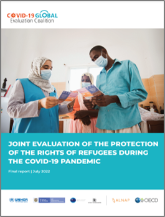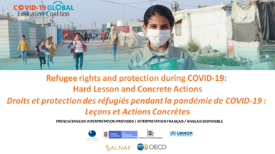Joint Evaluation of the Protection of Rights of Refugees during the COVID-19 pandemic

©UNHCR/Hallouli Mohamed Ameur Bangladesh. Vaccination campaign for Rohingya refugees launched in Cox’s Bazar (16 August 2021) © UNHCR/Amos HalderLebanon. Syrian refugees and daily life in refugee camps (12 October 2021) © UNHCR/Haidar Darwish
Joint Evaluation of the Protection of Rights of Refugees during the COVID-19 pandemic |
|
|
The COVID-19 pandemic challenged the protection of the fundamental rights of refugees in a way that is profound and with possible lasting impacts. Understanding how widespread this is, how effective international cooperation and the combined response of key actors has been, and what we can learn from the steps taken will be crucial to the implementation of current operations and the design of future strategies and plans. The evaluation was carried out from May 2021 to January 2022 as the pandemic continued to evolve and present a constantly changing set of consequences for legal systems, social norms and the functioning of aid systems that are designed to offer support to the upholding of refugee rights. The evaluation was undertaken completely remotely and with layered evaluations methods (data analysis, document review, funding analysis and key informant interviews) to gather a balanced set of evidence. |
|
Final Evaluation Report
Report: The Report provides the complete analysis of the impact of the COVID-19 pandemic on the Rights of Refugees. Annex: The Annex complements the Report by detailing relevant background data sources, supporting evidence, and case studies. Brief: The Brief summarizes the main lessons from the evaluation and highlights the recommendations for better protecting Refugee Rights. Executive Summary: The Summary consolidates the main findings and conclusions of the Joint Evaluation. (also available in Arabic, French, Spanish) |
|
ContextThe COVID-19 pandemic has exacerbated the pre-existing protection risks for refugees and host communities and challenged the protection of their fundamental rights. International refugee cooperation is focusing on sustaining the existing responses while tailoring it to address the additional impact of the pandemic on the overall protection environment. Refugee law continues to apply in challenging times, but the international refugee protection regime recognizes that countries may need to adapt their asylum systems to admit those in need of protection while protecting the health of their own populations. At the core of the regime is the safeguarding of basic human rights placed in particular jeopardy in refugee situations — the right to life, liberty and security of person, the right to be free from torture and other cruel or degrading treatment, the right not be discriminated against and the right of access to the basics necessary for survival (food, shelter, medical assistance), as well as for self-sufficiency (a livelihood) and education. COVID-19 has led to a heightened focus on a number of basic rights: freedom of movement, liberty and security of persons; concerns around discrimination and mistreatment, and the need to protect the most vulnerable. This evaluation puts in scope the right to seek and enjoy asylum; the right to health; protection against sexual and gender-based violence; child protection and family reunification; and addressing the protection rights of persons with specific needs. It also focuses on the importance of communities as the center of the response. |
|
StrategyThe joint evaluation will be carried under the auspices of the COVID-19 Global Evaluation Coalition. The purpose of the evaluation is to examine the effectiveness of international cooperation, and the combined response of host states, agencies and non-state actors, in ensuring the protection of the rights of refugees during the COVID-19 pandemic: to identify emerging good practice, innovation and adaptation to protection responses. Two years since the Global Refugee Forum, a high-level officials meeting (HLOM) is scheduled for December 2021 to review progress towards the objectives of the Global Compact on Refugees and chart the way forward. Progress data and information is being gathered throughout the year to inform this meeting. We are considering different ways to present the findings and discuss the recommendations from this evaluation as a part of this process. The evaluation report will be finalised and published end of February 2022. The objectives of the evaluation are as follows:
|
|
Reference GroupA reference group composed of critical actors in the international protection, humanitarian policy and research spheres, who will provide strategic advice to the evaluation team about the policy context and approach to ensure it delivers high quality evidence which are relevant to needs of decision-makers was formed. The group is co-chaired by Gillian Triggs, United Nations Assistant Secretary-General and Assistant High Commissioner for Protection at the Office of the United Nations High Commissioner for Refugees (UNHCR) and Susanna Moorehead, the elected Chair of the OECD’s Development Assistance Committee (DAC).
Triggs oversees UNHCR’s protection work for millions of refugees, internally displaced, stateless and other people of concern. An Australian national, she has previously held a number of leadership roles, including as President of the Asian Development Bank Administrative Tribunal, Chair of the UN Independent Expert Panel of Inquiry into Abuse of Office and Harassment in UNAIDS, Dean of the Faculty of Law and Challis Professor of International Law at the University of Sydney and as Director of the British Institute of International and Comparative Law in London. Triggs has been closely associated with a number of not-for-profit organizations throughout her career, including most recently as Chair of Justice Connect, an organization that connects 10,000 lawyers to provide pro bono advice to asylum-seekers and others in need of legal support in Australia. She is also the author of many books and papers on public international law. In July 2021 Gillian was awarded a Ruth Bader Ginsberg Inaugural Medal of Honour in recognition of her fight for the rule of law and gender equality.
The members included Dr. Dany Bahar, Senior Fellow, Global Economy and Development, Brookings Institution; Jean-Christophe Dumont, Head of the International Migration Division, Directorate for Employment, Labour and Social Affairs, OECD; Dr. Helen Durham, Director of International Law and Policy, International Committee of the Red Cross (ICRC); Priscille Geiser, Program Director, International Disability Alliance (IDA); Kareen Jabre, Director of the Division of Programmes, Inter Parliamentary Union; Claus Lindroos, Deputy Director General, Finnish Ministry for Foreign Affairs; Jane McAdam, Scientia Professor of Law, Director of the Kaldor Centre for International Refugee Law, UNSW Sydney ;Mark McCarthy, Chief (Information Management & Data Analytics), UN Human Rights; Anila Noor, Managing Director, New Women Connectors; Dr. Bilal Siddiqi, Director of Research at the University of California, Berkeley’s Center for Effective Global Action; Kathrine Starup, Head of Protection Unit - Global Protection Advisor, Danish Refugee Council (DRC); Manisha Thomas, Geneva Representative, Women's Refugee Commission; Najeeba Wazefedost, Founder of Global Refugee Network, Asia Pacific Network of Refugees; Vittoria Zanuso, Executive Director, Mayors Migration Council (MMC). The biographies of the members are available in the document section. |
|
PartnersThe evaluation is managed by the Evaluation Units of UNHCR, Ministry of Foreign Affairs of Finland, Governments of Colombia and Uganda, and the humanitarian system network ALNAP. ITAD and VALID are jointly working to conduct this evaluation.
|
|
  |
|
DocumentsBriefing Paper on the emerging findings of the Study COVID-19 Refugee Rights Inception Report: This Inception Report, the first output of phase 1 of the evaluation, details how the evaluation team will fulfil the evaluation ToR developed by the Evaluation Coalition (Annex 1), and provides a foundational element for the remaining phases of the evaluation. Terms of Reference: This ToR document outlines a framework for the joint evaluation of the role of international cooperation in protecting the rights of refugees in the context of global COVID-19 responses. Concept Note: The Inception report details how the evaluation team will fulfil the evaluation ToR developed by the Evaluation Coalition and provides a foundational element for the remaining phases of the evaluation. |
|
Launch Event - 8 July 2022 Speakers included Gillian Triggs, UN Assistant High Commissioner for Protection at UNHCR, and Susanna Moorehead, Chair of the OECD Development Assistance Committee (DAC). The co-chairs were joined by a panel of experts who shared insights and lessons on how to improve protection and respond to COVID-19 while respecting refugee rights and international law. Please find the Zoom recording of the meeting here. |
Related Documents

 The reports highlights findings, lessons and recommendations from the global evaluation under the auspices of the COVID-19 Global Evaluation Coalition, managed by UNHCR, and the Governments of Finland, Uganda and Colombia and ALNAP. This innovative learning initiative looked at what has worked to protect refugee rights and improve COVID-19 responses, and what the international community and states must do differently going forward.
The reports highlights findings, lessons and recommendations from the global evaluation under the auspices of the COVID-19 Global Evaluation Coalition, managed by UNHCR, and the Governments of Finland, Uganda and Colombia and ALNAP. This innovative learning initiative looked at what has worked to protect refugee rights and improve COVID-19 responses, and what the international community and states must do differently going forward.  Gillian Triggs is UNHCR’s Assistant High Commissioner for Protection. She was appointed on 9 August 2019. Triggs is a highly renowned expert in international law who has held a number of eminent appointments in service to human rights and the refugee cause, including most recently as the President of the Australian Human Rights Commission and the Vice-Chancellor’s Fellow and Emeritus Professor at the University of Melbourne.
Gillian Triggs is UNHCR’s Assistant High Commissioner for Protection. She was appointed on 9 August 2019. Triggs is a highly renowned expert in international law who has held a number of eminent appointments in service to human rights and the refugee cause, including most recently as the President of the Australian Human Rights Commission and the Vice-Chancellor’s Fellow and Emeritus Professor at the University of Melbourne. Susanna Moorehead was the British Ambassador to Ethiopia and Djibouti and UK Permanent Representative to the African Union and the United Nations Economic Commission for Africa. Over a 30 year career in international diplomacy and development, Moorehead has held senior executive, strategic, policy and operational roles - from the Board of the World Bank to famine relief in rural Africa. Moorehead served as the UK’s Executive Director on the Board of the World Bank; was Director of West and Southern Africa at the UK Department for International Development (DFID); and Head of DFID India, when it was the UK’s largest development programme. She directed field-based famine and rehabilitation programmes in rural Mali for Save the Children and was Deputy Director of the Institute of Development Studies, Sussex until 1997. Moorehead has a BA from the University of York, an MSc (Econ) and PhD from the London School of Economics, as well as an honorary doctorate from the University of York.
Susanna Moorehead was the British Ambassador to Ethiopia and Djibouti and UK Permanent Representative to the African Union and the United Nations Economic Commission for Africa. Over a 30 year career in international diplomacy and development, Moorehead has held senior executive, strategic, policy and operational roles - from the Board of the World Bank to famine relief in rural Africa. Moorehead served as the UK’s Executive Director on the Board of the World Bank; was Director of West and Southern Africa at the UK Department for International Development (DFID); and Head of DFID India, when it was the UK’s largest development programme. She directed field-based famine and rehabilitation programmes in rural Mali for Save the Children and was Deputy Director of the Institute of Development Studies, Sussex until 1997. Moorehead has a BA from the University of York, an MSc (Econ) and PhD from the London School of Economics, as well as an honorary doctorate from the University of York.




 The report was launched in a high-level learning event hosted by UNHCR, the COVID-19 Global Evaluation Coalition, and ALNAP.
The report was launched in a high-level learning event hosted by UNHCR, the COVID-19 Global Evaluation Coalition, and ALNAP.